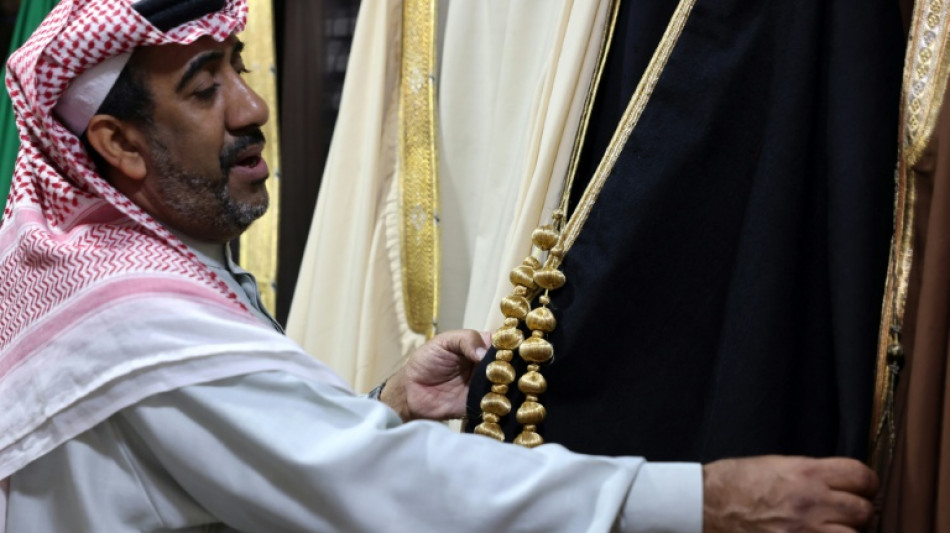
-
 US suspends visas for Gazans after far-right influencer posts
US suspends visas for Gazans after far-right influencer posts
-
Defending champ Sinner subdues Atmane to reach Cincinnati ATP final

-
 Nigeria arrests leaders of terror group accused of 2022 jailbreak
Nigeria arrests leaders of terror group accused of 2022 jailbreak
-
Kane and Diaz strike as Bayern beat Stuttgart in German Super Cup

-
 Australia coach Schmidt hails 'great bunch of young men'
Australia coach Schmidt hails 'great bunch of young men'
-
Brentford splash club-record fee on Ouattara

-
 Barcelona open Liga title defence strolling past nine-man Mallorca
Barcelona open Liga title defence strolling past nine-man Mallorca
-
Pogba watches as Monaco start Ligue 1 season with a win

-
 Canada moves to halt strike as hundreds of flights grounded
Canada moves to halt strike as hundreds of flights grounded
-
Forest seal swoop for Ipswich's Hutchinson

-
 Haaland fires Man City to opening win at Wolves
Haaland fires Man City to opening win at Wolves
-
Brazil's Bolsonaro leaves house arrest for medical exams

-
 Mikautadze gets Lyon off to winning start in Ligue 1 at Lens
Mikautadze gets Lyon off to winning start in Ligue 1 at Lens
-
Fires keep burning in western Spain as army is deployed

-
 Captain Wilson scores twice as Australia stun South Africa
Captain Wilson scores twice as Australia stun South Africa
-
Thompson eclipses Lyles and Hodgkinson makes stellar comeback

-
 Spurs get Frank off to flier, Sunderland win on Premier League return
Spurs get Frank off to flier, Sunderland win on Premier League return
-
Europeans try to stay on the board after Ukraine summit

-
 Richarlison stars as Spurs boss Frank seals first win
Richarlison stars as Spurs boss Frank seals first win
-
Hurricane Erin intensifies to 'catastrophic' category 5 storm in Caribbean

-
 Thompson beats Lyles in first 100m head-to-head since Paris Olympics
Thompson beats Lyles in first 100m head-to-head since Paris Olympics
-
Brazil's Bolsonaro leaves house arrest for court-approved medical exams

-
 Hodgkinson in sparkling track return one year after Olympic 800m gold
Hodgkinson in sparkling track return one year after Olympic 800m gold
-
Air Canada grounds hundreds of flights over cabin crew strike

-
 Hurricane Erin intensifies to category 4 storm as it nears Caribbean
Hurricane Erin intensifies to category 4 storm as it nears Caribbean
-
Championship leader Marc Marquez wins sprint at Austrian MotoGP

-
 Newcastle held by 10-man Villa after Konsa sees red
Newcastle held by 10-man Villa after Konsa sees red
-
Semenyo says alleged racist abuse at Liverpool 'will stay with me forever'

-
 Pakistan rescuers recover bodies after monsoon rains kill over 340
Pakistan rescuers recover bodies after monsoon rains kill over 340
-
In high-stakes summit, Trump, not Putin, budges

-
 Pakistan rescuers recover bodies after monsoon rains kill 340
Pakistan rescuers recover bodies after monsoon rains kill 340
-
Hurricane Erin intensifies to category 3 storm as it nears Caribbean

-
 Ukrainians see 'nothing' good from Trump-Putin meeting
Ukrainians see 'nothing' good from Trump-Putin meeting
-
Pakistan rescuers recover bodies after monsoon rains kill 320

-
 Bob Simpson: Australian cricket captain and influential coach
Bob Simpson: Australian cricket captain and influential coach
-
Air Canada flight attendants strike over pay, shutting down service

-
 Air Canada set to shut down over flight attendants strike
Air Canada set to shut down over flight attendants strike
-
Sabalenka and Gauff crash out in Cincinnati as Alcaraz survives to reach semis

-
 Majority of Americans think alcohol bad for health: poll
Majority of Americans think alcohol bad for health: poll
-
Hurricane Erin intensifies in Atlantic, eyes Caribbean

-
 Louisiana sues Roblox game platform over child safety
Louisiana sues Roblox game platform over child safety
-
Trump and Putin end summit without Ukraine deal

-
 Kildunne confident Women's Rugby World Cup 'heartbreak' can inspire England to glory
Kildunne confident Women's Rugby World Cup 'heartbreak' can inspire England to glory
-
Arsenal 'digging for gold' as title bid starts at new-look Man Utd

-
 El Salvador to jail gang suspects without trial until 2027
El Salvador to jail gang suspects without trial until 2027
-
Alcaraz survives to reach Cincy semis as Rybakina topples No. 1 Sabalenka

-
 Trump, Putin cite progress but no Ukraine deal at summit
Trump, Putin cite progress but no Ukraine deal at summit
-
Trump hails Putin summit but no specifics on Ukraine

-
 Trump, Putin wrap up high-stakes Ukraine talks
Trump, Putin wrap up high-stakes Ukraine talks
-
El Salvador extends detention of suspected gang members


'My entire life': Saudi tailor keeps robe-making craft alive
Saudi tailor Habib Mohammed's shop once made ornate, hand-woven cloaks for royals, a time-honoured craft he is determined to preserve even as mass-produced garments flood the market, threatening his traditional business.
He makes "bisht", a long gown which for centuries has been a status symbol, worn by kings and princes -- and ordinary men -- and could take a week of meticulous work to create.
Now, with cheap Chinese-made robes taking a bite out of his business, the 60-year-old tailor is struggling to make a profit, and his only son wouldn't take over the beleaguered shop.
But Mohammed refuses to let the ancient craft die, searching for ways to hand down his knowledge.
"We've started training here at the shop and at home," he told AFP in his windowless atelier in the oasis city of Hofuf, with bishts hanging all around.
"I am teaching my grandchildren, be they girls or boys."
In Mohammed's native Al-Ahsa governorate, it was "considered shameful for a man to go to a funeral or a market, or make a visit to anyone anywhere without wearing the bisht", he said.
The bisht came to global attention in 2022 when Qatar's emir draped one over football star Lionel Messi after the World Cup final.
Although Arabs across the Gulf still sometimes wear traditional garb, especially in formal settings, factory-made clothing has replaced tailor services in the oil-rich countries of the region.
- Robe 'recession' -
At his workshop, Mohammed watched over his granddaughter Fajr, nine, and grandson Ghassan, 10, as they embroidered delicate gowns.
For the veteran craftsman, who learned to weave when he was only five, this is "my entire life".
"I came into this world... seeing only bishts around me," said Mohammed, wearing the Saudi national dress of white thobe robe and chequered red-and-white headdress.
"I was born in (my father's) tailor shop and grew up watching my mother sew. I saw my brothers and cousins work with my father in the tailor shop," he added with pride.
His wife was also a bisht seamstress, he said, skilled at collar embroidery.
But his modest shop in an artisans' market in Hofuf has fallen on hard times.
"A sort of recession has taken hold," he said.
A high-quality bisht could once have fetched up to 6,000 riyals ($1,600), but machine-made cloaks sell for just a fraction of that price, Mohammed said.
"Pieces I would make for 1,500 riyals now go for 150 riyals. It's not enough to make a living."
- 'Didn't give up' -
Mohammed refuses to let the tradition die out, and he is far from alone.
A bisht revival is taking shape in Saudi Arabia even as it opens up to the world, attracting tourists and foreign businesses.
Last year, the kingdom ordered ministers and other senior officials to wear a bisht when entering or leaving the workplace or attending formal events.
Saudi Arabia has named 2025 the Year of Handicrafts, when it will promote and support 10 crafts including bisht-weaving.
And Gulf countries are trying to include the bisht on the UNESCO list of intangible cultural heritage in a bid to preserve the craft.
Some of the bishts hanging on the walls of Mohammed's workshop are at least a century old, he said, proudly presenting a brown robe made from sheep's wool.
"Someone offered me 200,000 riyals for this, but I refused to sell it because it is as dear to me as my life. It represents my country's history," he said.
"I want to pass them down to my children and grandchildren, and I will instruct them never to sell them," he said, pointing to the pieces on the walls.
Mohammed also gives weekly bisht tailoring lessons at a nearby institute, mostly for young people.
"We didn't give up," he said, training the younger generation "to revive an old heritage that was disappearing".
"We will bring it to life once more," said Mohammed.
N.Shalabi--SF-PST
